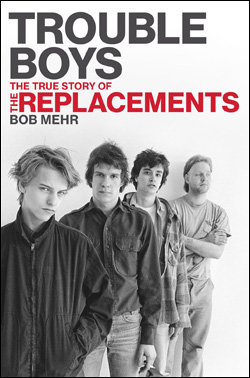 There are countless tales of rock & roll dreams busted by excessive indulgences, personal ghosts, and/or muddied relationships. But while there are tragedies involving greater falls from greatness, there’s perhaps no story more frustratingly disastrous as that of The Replacements. Fortunately, that tale has been achingly told in detail in an exhaustive biography, the recently released Trouble Boys: The True Story of the Replacements (Da Capo Press).
There are countless tales of rock & roll dreams busted by excessive indulgences, personal ghosts, and/or muddied relationships. But while there are tragedies involving greater falls from greatness, there’s perhaps no story more frustratingly disastrous as that of The Replacements. Fortunately, that tale has been achingly told in detail in an exhaustive biography, the recently released Trouble Boys: The True Story of the Replacements (Da Capo Press).
Authored by Memphis-based music journalist Bob Mehr, Trouble Boys leaves no stone unturned. Mehr reportedly spent the last decade on the book, interviewing singer Paul Westerberg, bassist Tommy Stinson, guitarist Slim Dunlap, manager Peter Jesperson, and countless other important (and not so important) figures in The Replacements story. (He also had interviews with drummer Chris Mars from before he started working on the book.) With additional quotes pulled in from a multitude of sources, Mehr has painstakingly recounted the band’s story from start to finish, not to mention each of the members’ individual stories as well.
Of course, with the book beginning with original guitarist Bob Stinson’s funeral, we know where the band is headed from the get-go. Learning how they got there is the pained pleasure of reading the biography. Over the course of 450 pages, we find out how The Replacements went from being a joyful mess of a band to simply a mess. Though they started out with gusto as a band of brothers who shared dysfunctional family backgrounds as well as a hard-nosed Midwestern sensibility, such common personal histories would ultimately be their undoing. Though the band was notorious for playing shambolic shows fueled by a massive intake of alcohol, the real drinking occurred offstage and contributed to not only the demise of Bob Stinson, but the demise of the band as well.
But it wasn’t just the alcohol that did the band in. An innate stubbornness not to play by anyone’s rules led to money misspent and blown opportunities. No doubt such obstinance contributed to albums like Let It Be and Tim being the records for the ages that they are, but a constant question of what could have been hung over the band like an albatross before and after. Nirvana would take over the world not long after The Replacements called it a day, and it’s not hard to hear the direct lineage from the Mats to the grunge figureheads. In short, every time it seemed like all the pieces were in place for the band to get the recognition they deserved, one of them would fall out or the band would topple the table.
Mehr does an excellent job of tracking down everyone with whom the band worked or almost worked or fired (producers, mangers, label executives, etc.). As such, one gets a complete picture of how the band developed and the struggles behind each album and each tour. He also delves into the romantic and familial relationships of each member, as those interactions fed the music and their collective wild mood swings. The band has become notorious as drunken savants, but Mehr dismantles the myths surrounding the band and shows the human imperfections of the individuals behind the music. He also reveals the constant struggle of desiring success, but always seeming to reflexively push in the opposite direction. That this pattern repeats itself again and again as the years pass with the progression of the book is almost too much to bear.
It’s a testament to the quality of the telling that as one gets caught up in The Replacements’ tale, it’s impossible not to hope for the best even though we know what’s coming. Few books truly capture the dynamics that led to a band’s success and/or failure, but Mehr does just that. The Replacements’ failings probably had as much to do with the lasting poignancy of their music as anything else, and Trouble Boys is an astute depiction of this seminal band and its legacy.

Your Comments